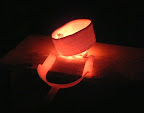When I was
living in the Seagrove, NC area, I had the opportunity to work part-time for
Ben Owen, III, at Ben Owen Pottery, right after he graduated from ECU in 1993.
I didn’t do any of the pottery production, but I was there to help with
glazing, clay processing, load and fire the groundhog kiln, work in the sales
shop, etc. It was wonderful to be in that environment and become knowledgeable
of many of the aspects that Ben Owen Pottery was known for.
Getting to become
familiar with the traditional glazes, such as Frogskin, Chinese Red, Chinese
Blue, Dogwood White, etc. was one of the most noteworthy experiences of my
tenure there. The glaze that intrigued me most was Chinese Blue. Its history
began at Jugtown Pottery and was developed by its owner Jacques Busbee. Ben Owen, Sr., who started working at Jugtown as a potter in 1923, was also involved with this particular glaze. After the death of Mr. Busbee in 1947, the glaze's use was discontinued at the request of Mrs. Busbee in memoriam to her husband. Upon Ben Owen, Sr.'s departure from Jugtown and the subsequent opening of his own
establishment (Old Plank Road Pottery) in 1959, he revived the Chinese Blue glaze based on his knowledge gained while at Jugtown Pottery. After Ben Owen, Sr. retired from making pots
in 1972, the shop closed until Ben “Wade” Owen, Jr. reopened it in 1981. During
Wade’s time running the pottery, the use of Chinese Blue was, once again,
revived. When Ben Own, III took over the pottery, he continued the Chinese Blue
legacy.
During my
time there I became interested in formulating a glaze that would replicate, as
close as I could, the Chinese Blue. I had no idea what the Ben Owen Pottery Chinese
Blue glaze consisted of, but pulling from my Ceramics education received in
college, I set about experimenting and putting tests in a few of the firings. I
had one test come out which a collector of early Jugtown Chinese Blue told me it
was very reminiscent of the old glaze. After helping Ben, III for four or so
years, I stopped working there and, subsequently, abandoned further pursuit of
the glaze.
Fast forward
twenty five years. With the completion of my small down-draft wood kiln, I aim
to pick back up with testing my own formulations. Having been fortunate to see how the glaze
was applied and how it was fired in the groundhog kiln, I feel this kiln will
provide a good setting for further experimentation. I have always thought it to
be a beautiful glaze, and it is one with such a rich North Carolina pottery
history.
Stay tuned!
The images below show Chinese Blue through the years. It has slightly changed in appearance over time.
This is a Jugtown Pottery piece that depicts what the Chinese Blue glaze looked back in the early period when Ben Owen, Sr. was making pots there.
This is a piece by Ben Owen, Sr. from the time period that he was operating his own shop.
I bought this Chinese Blue vase from Ben Owen Pottery in 1984 when Wade Owen was operating the pottery.
A piece made by Ben Owen, III, glazed in Chinese Blue during my time working at Ben Owen Pottery. This shows what the glaze looked like in the mid 1990s.
This is one of my Chinese Blue tests that I was working on while at the pottery.
This is a current piece by Ben Owen, III that shows the contemporary Chinese Blue glaze.








